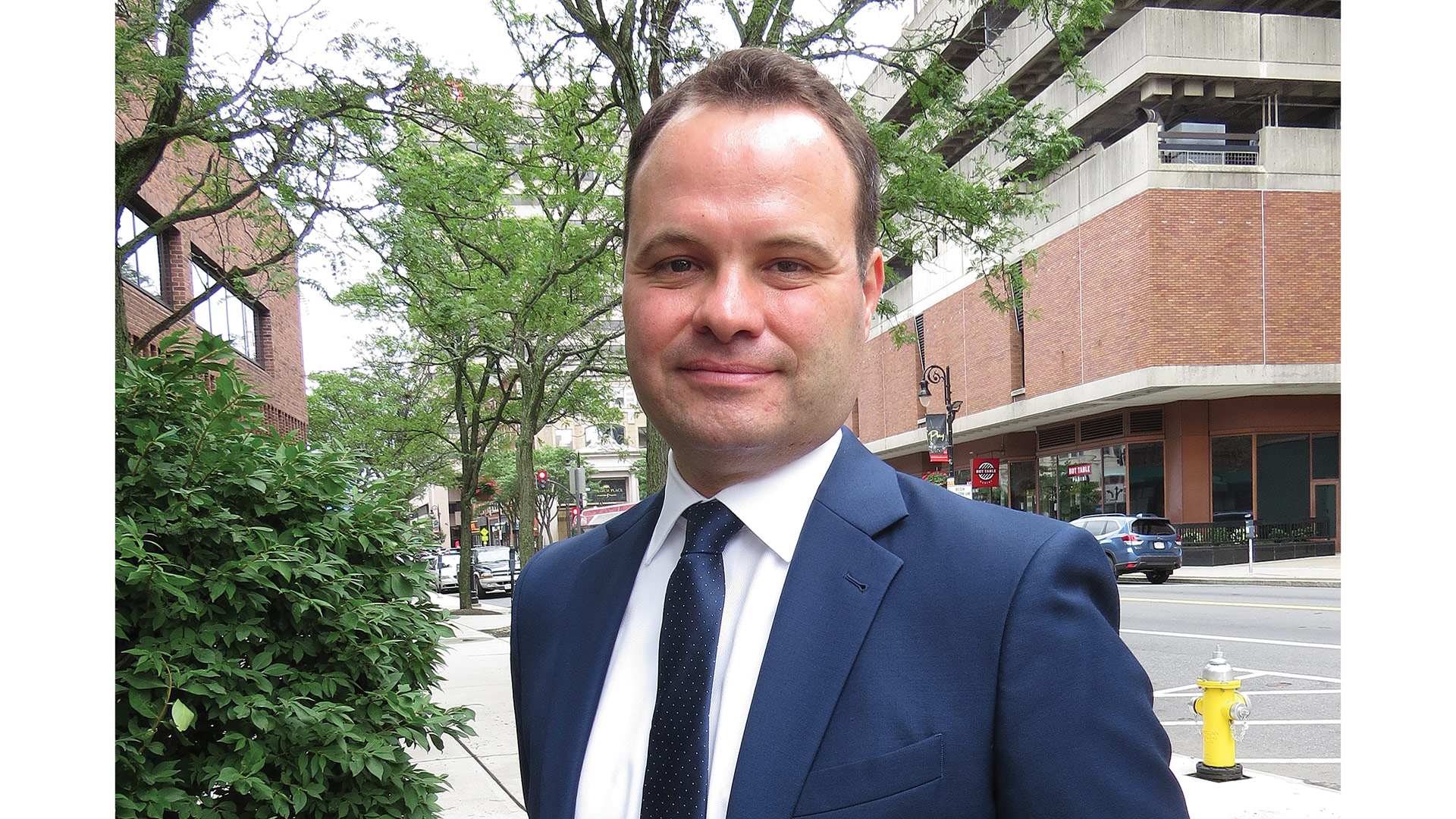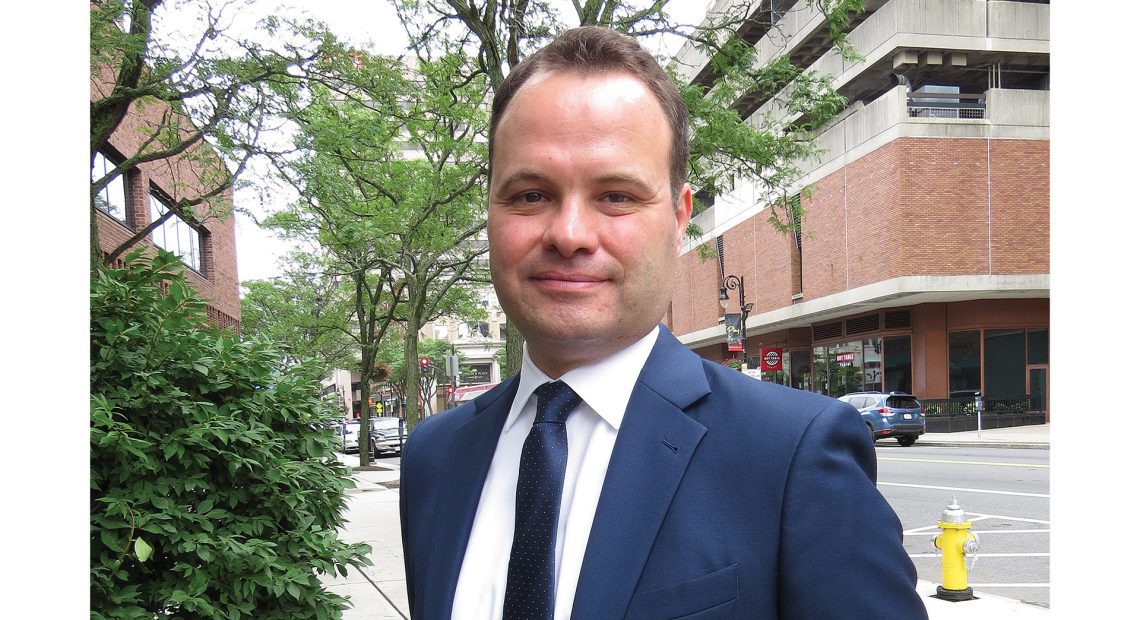The Future of Work
By Mark Morris

State Sen. Eric Lesser says the pandemic accelerated a number of work trends that were already in motion.
Topics like ‘the future of work’ can often sound like a lofty concept, something that’s years or even decades away from the present.
But to state Sen. Eric Lesser, the future of work has already arrived.
Lesser and state Rep. Josh Cutler co-chaired a commission on the future of work and recently released its final report.
The commission came to be after Lesser authored and filed legislation back in 2019 to address the rapid changes that are happening in workplaces across the state. From increased automation and robotics to international trade policies, all these factors affect the economy and the lives of workers in Massachusetts. The arrival of COVID-19 only accelerated and intensified these economic changes.
“The idea was to take a peek over the horizon, to look beyond COVID to see what a worker’s experience will be over the next five to 10 years, and how we can prepare for that,” Lesser said.
The legislation was signed into law in January 2021 by Gov. Charlie Baker as part of an economic-development bill. Lesser called the commission “diverse in every sense,” with members representing the private sector, the public sector, labor, and academia. Members of the commission also hailed from every region of Massachusetts.
“We gathered a group of people with a diverse set of experiences, backgrounds, and perspectives,” Lesser said. “It was important to reach consensus by considering all our viewpoints.”
A major finding of the commission’s report discusses how every type of worker is facing some new level of technology integration into their jobs. Lesser gave an example of a restaurant server who once needed only a pad and pen to take dinner orders.
“The idea was to take a peek over the horizon, to look beyond COVID to see what a worker’s experience will be over the next five to 10 years, and how we can prepare for that.”
“Now many restaurants have software programs to keep track of orders, payments, and reservations,” he said. “We’re seeing this type of technology integration in jobs across industries.”
In order to qualify for jobs that use ever-changing technology, training workers for current and future jobs becomes essential.
“One finding in the report said the state of Massachusetts has to train or retrain 30,000 to 40,000 workers a year just to keep up with all the workplace changes,” Lesser said. “That’s more than double our current capacity at the MassHire Workforce Training Center.”
On top of all the challenges on the job, another key finding addressed work-adjacent issues that affect workers off the job and impact family stability. Escalating costs for childcare and housing are among the top work-adjacent concerns.
“Private childcare in Massachusetts is $8,000 higher than the national average,” Lesser said. As a byproduct of COVID, the price of houses and rents are soaring, which forces people to live further away from their workplaces and exacerbates another concern — transportation.
So, What’s the Answer?
While it’s easy to list all the issues confronting workers in Massachusetts, Lesser said the report also provides recommendations to guide legislation going forward to address these concerns and make life better for workers in the state.
“The idea is to integrate the findings and perspectives of the report into everything the state does,” he noted, giving examples of upcoming legislation on healthcare and economic development where the Future of Work report aided in drafting the bills.
The most pressing area where the report can influence workplace policies involves putting a focus on equity and inclusion to make sure no one is left behind. The report reveals serious roadblocks to finding meaningful work, which Lesser wants to see addressed.
“More than one-third of families in Springfield do not own a laptop or desktop computer,” he noted. “Today, nearly every employer requires the first application be done electronically, so right off the bat it locks out a whole population of people.”
The report also suggests an increase in language training for non-English speakers, which would make it easier for immigrants to join the workforce instead of being held back by language skills.
“Predictions are that today’s worker will have 12 different jobs over the course of their work career. That number will only increase five to 10 years from now, so the notion of training for a job once is really obsolete.”
While the report is future-focused, Lesser quickly pointed out that traditional models for successful careers are already out of touch with the demands of today’s workforce. The old model where workers learned a craft or students went to college and then joined the workforce for the next 45 years without much change rarely happens these days.
“Predictions are that today’s worker will have 12 different jobs over the course of their work career,” he said. “That number will only increase five to 10 years from now, so the notion of training for a job once is really obsolete.”
To adjust to a world that keeps changing at a faster pace, the report recommends an emphasis on “stackable credentials” for workers, with constant, specific training keeping them current and promotable.
“By acquiring skills that stack on top of each other, workers can move up the skill ladder, move up the income ladder, and build out a fulfilling career as a result,” Lesser explained.
As technology demands in the workplace keep advancing, the workforce itself is aging, especially in Massachusetts. Baby Boomers are staying on the job longer than previous generations, partly for financial reasons and because technology has lessened the physical demands of work. Lesser said it’s important to consider the needs of an aging workforce from several perspectives, including work-adjacent issues.
“It’s not surprising to see workers dealing with childcare and elder care for their parents,” Lesser said. “The work culture hasn’t really accounted for that type of situation because it’s a more recent consideration.”
All these issues are called out in the report to enable the state to have information on what’s needed to help workers in the years ahead, he added. “The state needs to do its part to make sure all these work-adjacent issues are considered when planning the future of work.”
Strong Foundation
While all these issues and concerns can sound dramatic and overwhelming, Lesser said it’s important to remember all the contributions made by the Massachusetts economy and its workers. Early development of COVID vaccines, as well as many breakthroughs in life sciences and new technologies, are just some of the innovations the state can claim.
“We are well-positioned to benefit from all these changes because we have a highly skilled workforce, great educational institutions, and leadership in many fields,” he noted.
Looking ahead, Massachusetts has a positive story to tell. Lesser said the next challenge is to make sure “this booming engine of a state” includes all communities.
“As a result of all the changes in the workplace, we are making contributions to the world. Now we want to make sure we continue to do this without leaving people behind in the process.”





